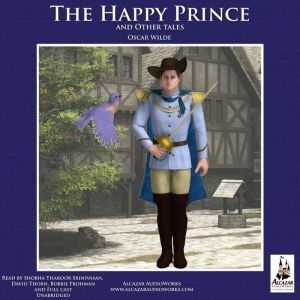

The Happy Prince, and Other Tales
Author: Oscar Wilde
Narrator: Shobha Tharoor Srinivasan, Bobbie Frohman, David Thorn
Unabridged: 1 hr 50 min
Format: Digital Audiobook Download
Publisher: Alcazar AudioWorks
Published: 02/20/2014


Author: Oscar Wilde
Narrator: Shobha Tharoor Srinivasan, Bobbie Frohman, David Thorn
Unabridged: 1 hr 50 min
Format: Digital Audiobook Download
Publisher: Alcazar AudioWorks
Published: 02/20/2014
Oscar Wilde (1854–1900) was born in Dublin. He won scholarships to both Trinity College, Dublin, and Magdalen College, Oxford. In 1875, he began publishing poetry in literary magazines, and in 1878, he won the coveted Newdigate Prize for English poetry. He had a reputation as a flamboyant wit and man-about-town. After his marriage to Constance Lloyd in 1884, he tried to establish himself as a writer, but with little initial success. However, his three volumes of short fiction, The Happy Prince, Lord Arthur Savile’s Crime, and A House of Pomegranates, together with his only novel, The Picture of Dorian Gray, gradually won him a reputation as a modern writer with an original talent. That reputation was confirmed and enhanced by the phenomenal success of his society comedies: Lady Windermere’s Fan, A Woman of No Importance, An Ideal Husband, and The Importance of Being Earnest, all performed on London’s West End stage between 1892 and 1895. In 1895, he was convicted of engaging in homosexual acts, which were then illegal, and sentenced to two years imprisonment with hard labor. He soon declared bankruptcy, and his property was auctioned off. In 1896, he lost legal custody of his children. When his mother died that same year, his wife Constance visited him at the jail to bring him the news. It was the last time they saw each other. In the years after his release, his health deteriorated. In November 1900, he died in Paris at the age of forty-six.
Sobha Tharoor Srinivasan has worked in radio, television, and theater since she was a child. After emigrating from India to the United States, she studied literature in college and has worked as speech coach, grant writer, and audiobook narrator.
Bobbie Frohman, a third generation Californian, was raised in a large extended family, the niece of cowboys. Early on she developed a deep love of animals, training her dogs to perform with her at dog shows, and as a competitive barrel racer with her beloved horse, Lucky.
David Thorn spent his childhood in the Channel Islands off the coast of France, was schooled in England, and then immigrated to the United States at the age of twenty-three. He is retired from international commerce and currently resides in California.
Lovely tales. Read it as a little kid. Loved it beyond time and measure. Q: The Happy Prince The Nightingale and the Rose The Selfish Giant The Devoted Friend The Remarkable Rocket (c) Q: "She has no conversation," he said, "and I am afraid that she is a coquette, for she is always flirting with the wind."......more
I wish I had read this collection of fairy tales before I started writing reviews. I decided to read one story every night before bed. After all, these are fairy tales—that’s what you do with them. Big mistake. Instead of putting me to sleep, they kept me awake, making me think for at least an hour.......more
Note to self: never ever try to read/finish this book on a train or anywhere in public! To think that the author who kept the stiff Victorians in stitches with his plays could write such heart-wrenching stuff.... Ahhhh, don't talk to me today, I am totally undone.......more